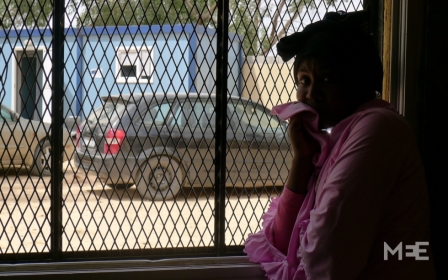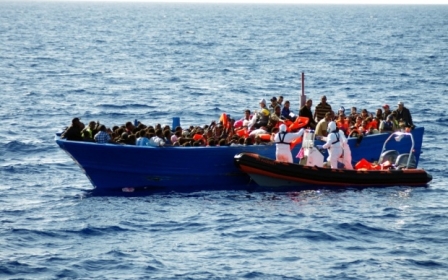Libya's Tobruk government 'very worried' about EU boat-bombing plans

The EU’s High Representative Federica Mogherini is expected to put forward EU plans for possible military intervention in Libya to the UN Security Council later today.
The EU has become greatly alarmed by the rise in migration from Libya which has surged this year and now hopes to gain UN approval for a planned military campaign that would target trafficking networks in the Mediterranean.
On Monday, Libya’s democratically elected but contested government in eastern Libya, the House of Representatives, slammed the proposals, saying that it was “very worried” about the prospect of military intervention.
The HoR’s ambassador to the EU, Ibrahim Dabbashi, also lashed out at the international community for arming militias that are loyal to the opposing Tripoli-based General National Congress, although it was not clear whether he was directly blaming the EU or other powers.
The GNC has so far stayed quiet on military intervention but did say it was keen to guarantee other kinds of support to help stem the migrant and refugee tide.
The acting prime minister of Libya's disputed government on Saturday urged EU countries to help his administration by sending boats for the coastguard.
Mohammed Khalifa al-Guwail also said the EU should "have direct contact" with his government despite it not being recognised by the international community.
"We invite the European Union and the international community, namely Italy and southern Europe, to help Libya, in particular the National Salvation Government in Tripoli," Guwail told AFP.
"They must have direct contact with us to discuss ways of helping stem illegal immigration, and to provide us with boats... and assistance for those (migrants) held in detention centres."
'Ghastly conditions'
Conditions in these centres and general treatment of migrants across Libya has been widely criticised by rights groups.
In recent weeks, MEE's Tom Westcott visited the Sorman Detention Centre, one of 20 overcrowded and chronically underfunded facilities in the country.
At Sorman, 156 women and 11 children live amongst staff who wear masks because they claim the women carry diseases. Many of the women at the centre came to Libya, hoping to find jobs, but instead found themselves in what Westcott describes as a dank prison.
Without medical care, the centre's head Colonel Ibrahim Al-Mahjoubi delivers babies born at the facility. An NGO worker told Westcott that exorcisms were organised to help women in the centre with severe mental health cases.
In a report released on Monday, Amnesty International condemned the “ghastly conditions” which it said were “coupled with spiralling lawlessness and armed conflicts” that had made life in Libya extremely dangerous.
“With no legal avenues to escape and seek safety, they are forced to place their lives in the hands of smugglers who callously extort, abuse and attack them,” said Philip Luther, Amnesty International’s Middle East and North Africa director.
The EU resolution authorising intervention is believed to have been drafted by permanent council member Britain, senior officials in Brussels told the Guardian.
Veto-wielding member Russia, however, has said that it would veto any resolution that allowed for the destruction of boats.
According to reports in the Financial Times, a draft resolution with “a more restricted mandate” could be on the table, but Russia is likely to tread very carefully.
The Russians, along with the Chinese, abstained in the March 2011 UN Security Council vote authorising a no-fly zone over Libya, but later protested the move when NATO backed by Arab allies extended their bombing campaign, which eventually helped oust leader Muammar Gaddafi.
Descent into chaos
The security situation in Libya has been tense since his overthrow but has deteriorated further since last summer when the GNC claimed that the HoR’s election was illegitimate and refused to step down.
“The international community has stood and watched as Libya has descended into chaos since the 2011 NATO military campaign ended, effectively allowing militias and armed groups to run amok,” Luther said. “World leaders have a responsibility and must be prepared to face the consequences, which include greater levels of refugees and migrants fleeing conflict and rampant abuse in Libya. Asylum-seekers and migrants are among the most vulnerable people in Libya and their plight must not be ignored.”
Since then Libya has been ruled by two opposing parliaments, as well as a raft of militias. In recent months, groups loyal to Islamic State have also managed to gain ground in the country, further exasperating fears in Europe about the growing migrant and refugee tide from the oil-rich country.
The EU Commission is due to propose amending current migration and asylum rules on Wednesday, and will urge member states to accept a quota scheme.
Quotas would be determined on a range of factors, including population, economic indicators and the number of asylum seekers previously accepted.
Germany, which received 200,000 asylum applications in 2014, is reportedly in favour of the proposals, but many other member states including the UK are firmly opposed.
The UN estimates that 60,000 people have already tried to cross the Mediterranean in 2015. More than 1,800 have died this year attempting the journey, a 20-fold increase on the same period in 2014.
Middle East Eye propose une couverture et une analyse indépendantes et incomparables du Moyen-Orient, de l’Afrique du Nord et d’autres régions du monde. Pour en savoir plus sur la reprise de ce contenu et les frais qui s’appliquent, veuillez remplir ce formulaire [en anglais]. Pour en savoir plus sur MEE, cliquez ici [en anglais].




